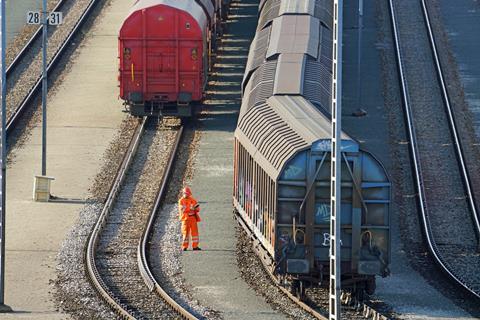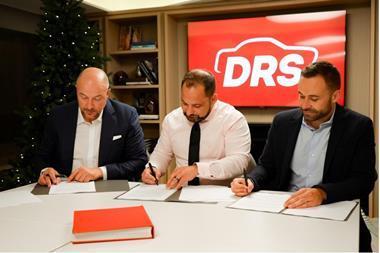The German locomotive drivers’ union GDL has called for a fourth wave of strike action this week against Deutsche Bahn (DB), the state-run rail and logistics provider. The latest action calls for the inclusion of rail freight drivers employed by DB Cargo, along with passenger services.

The GDL union is striking over pay and conditions, having rejected an offer from DB on Friday last week that included a 13% wage increase and the offer of a 37-hour week with the same salary. The union is asking for a 35-hour week for shift workers without a pro-rata reduction in pay.
GDL is calling on members at DB Cargo to take industrial action on January 23 (Tuesday) at 18.00, followed by action across all DB divisions to start on January 24 at 02.00. That combined action is to run until 18.00 on January 29.
The action adds to disruption on the German rail freight network, including for automotive parts and vehicle shipments both in Germany and to and from neighbouring countries. Extensive renovation work on the German rail network, which began in 2022, is disrupting the movement of freight and has reduced available capacity for goods movements by more than a third.
Carmakers confident of coping
Responding to the announcement of strike action and its potential impact on inbound and outbound logistics, BMW Group said its plants in Germany were running according to plan.
“We are currently assuming that the warning strike in rail freight transport will not lead to any disruption to production at our BMW Group plants or within our dealer network,” said a spokesperson for the carmaker.
Meanwhile, Audi and Volkswagen concurred (as part of VW Group) that they were doing everything in their power to maintain logistics chains during the rail strike.
“To this end, the company is in close contact with its logistics partners and [will] flexibly adapt its logistics concepts to the current situation in the transport market,” said a spokesperson for Audi. “This includes, for example, converting volumes to truck transport. It is not possible to estimate the possible effects of the strike at this time, as they depend on the concrete course of the strike and, above all, the restart of the network.”
That reservation subject to developments, and confidence in resilience across transport modes, is borne out by finished vehicle providers in Europe, who have not reported any likely disruption so far.
GDL demands
GDL staged two 24-hour strikes in 2023 and another three-day strike earlier in January this year that hit passenger rail services. The union is calling for a monthly increase in pay of €555 ($605) before tax for its members, and an inflation compensation payment fixed for 12 months set at €3,000 for full and part time employees. It is also calling for a reduction in shift workers’ hours from 38 to 35 per week, without affecting pay. Additionally, GDL is asking for the introduction of a five-shift week for shift workers, which stipulates that after five shifts, or 120 hours, the subsequent rest period must be at least 48 hours (see boxout).
Deutsche Bahn said the strike action affecting DB Cargo means there will be significant restrictions for industry and the economy in rail freight transport. The rail provider said that it will be prioritising support for critical industries. DB Cargo added that it would do everything in coordination with its customers to bring supply-relevant freight trains to their destinations.
A spokesperson for Deutsche Bahn told Automotive Logistics that the six-day strike by GDL is a strike against the German economy.
“A 144-hour strike has a direct impact on industrial supply chains and disrupts them in the long term. This is because DB Cargo is a European network railroad, unlike many of its competitors, which mainly offer simple shuttle services.”
With reference to DB Cargo, the rail provider emphasised that one of the division’s unique selling points is its single wagonload service.
“In a Europe-wide network with more than 4,000 access points and nine large freight stations in Germany, even small freight volumes are transported in freight wagons for customers to the yard or to the loading ramp,” said DB’s spokesperson.
That distribution model made it ideal for large-scale industry in particular, including for finished EV movements or the transport of steel sheets for cars, according to DB. It also benefits sustainable logistics, with single wagonload transport considered particularly climate-friendly and adaptable to customer requirements.
“Due to the high manual effort involved in shunting and coupling freight wagons, a strike here leads to major disruption,” said DB.
Martin Seiler, director of human resources and legal affairs at DB, said in a statement: “Although we have made major concessions, the train drivers’ union is not even ready to negotiate. Everything is now on the table: an above-average salary agreement and a reduction in working hours with the same salary. The need of the hour is to take responsibility and finally negotiate again. Especially in these times, a strong social partnership is more important than ever. This necessarily involves compromises. We are ready to negotiate at any time and any place.”
GDL described DB’s most recent offer as “bogus” and that there was ”no trace of any desire to reach agreement”.
DB Schenker sale
Last month DB announced it had launched the sale of its DB Schenker logistics subsidiary as part of its focus on strengthening the provision of rail services. It said the sale would “significantly accelerate [the] focus on its core business and the implementation of the Strong Rail strategy”. The strategy aims to ensure that 70% of freight is transported by rail in Germany by 2030. It said that was equivalent to 13m fewer truck journeys on German roads, with corresponding lower emissions. It said it planned to reduce CO2 emissions by 10.5m tonnes per year by shifting transport to rail and increase the market share of rail in freight transport to 25% from the current 18%.
GDL demands for pay and conditions
1. A general wage increase of €555, a correspondingly significant increase in training allowances and an increase in all allowances by 25%;
2. Reduction of weekly working hours to 35 hours for shift workers without a pro-rata reduction in pay, whereby the employee can voluntarily increase the working hours (pay is increased pro rata);
3. An inflation compensation bonus of €3,000, equally for full-time and part-time employees;
4. 5% employer contribution to the company pension plan;
5. Introduction of a five-shift week for employees in shift work (after five shifts or 120 hours at the latest, the next rest day must be at least 48 hours).


























![Global[1]](https://d3n5uof8vony13.cloudfront.net/Pictures/web/a/d/s/global1_726550.svgz)













No comments yet